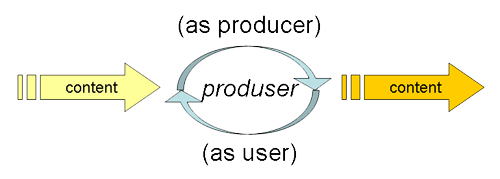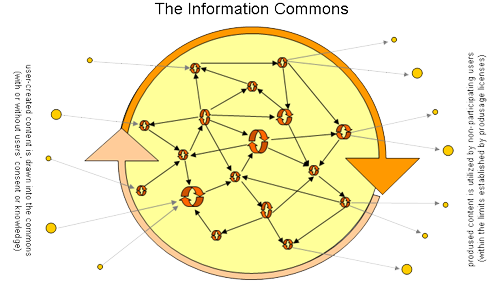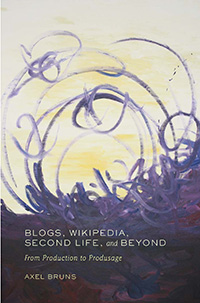You are here
Produsage: A Working Definition
In collaborative communities the creation of shared content takes place in a networked, participatory environment which breaks down the boundaries between producers and consumers and instead enables all participants to be users as well as producers of information and knowledge - frequently in a hybrid role of produser where usage is necessarily also productive. Produsers engage not in a traditional form of content production, but are instead involved in produsage - the collaborative and continuous building and extending of existing content in pursuit of further improvement. Participants in such activities are not producers in a conventional, industrial sense, as that term implies a distinction between producers and consumers which no longer exists; the artefacts of their work are not products existing as discrete, complete packages; and their activities are not a form of production because they proceed based on a set of preconditions and principles that are markedly at odds with the conventional industrial model.
The produsage process itself is fundamentally built on the affordances of the technosocial framework of the networked environment, then, and here especially on the harnessing of user communities that is made possible by their networking through many-to-many communications media. By providing such functionality, network technologies have substantially extended the boundaries for the community of participants able to contribute to the produsage project. Indeed, even those members of the networked population who choose for the moment to remain users, simply utilising the 'products' of the produsage process as substitutes for industrial products, are always already potential produsers themselves - and recent developments have made it ever more easy, and in some cases even inevitable, for such users to become produsers (for example as their very patterns of usage become direct inputs to the continuing processes of produsage).

The Produser
While produsage processes produce real outcomes, and while we could therefore describe produsage as a (commons-based, peer-to-peer) form of production, to understand the collaborative processes involved in produsage, and to examine their influence on the form and content of the information, knowledge, and creative work prodused in the process, our focus must turn elsewhere. An important consequence of this shift of focus, then, is also that we must revise our understanding of the outcomes of produsage process, distinguishing them from the products of the industrial model. Although produsage outcomes can substitute for conventional products, this dressing-up of the temporary outcomes of a continuing process as 'products' in their own right should not be misunderstood to indicate that these artefacts are anything but temporary, that they are anything other than artefacts. A physical product - and by extension, an informational product produced and distributed through conventional industrial models which are ultimately rooted in physical production paradigms - is defined by its boundedness; it is 'the complete package,' a self-contained, unified, finished entity. By contrast, the 'products' of the collaborative content creation efforts which we examine throughout this book are the polar opposites of such products: they are inherently incomplete, always evolving, modular, networked, and never finished. Their process of 'production' is a process of perpetual, ceaseless, continuous update, extension, and revision which operates not according to a predetermined blueprint or design, but is driven by the vagaries of user-producer interest in and enthusiasm for fixing specific problems or extending particular aspects of the project. Its outcomes are artefacts, not products.

The Information Commons of Produsage
The social, collaborative basis of the content creation communities engaged in produsage also indicates this; in produsage projects, the object of the communal effort is almost always as much the development of social structures to support and sustain the shared project as it is the development of that project itself. As Eric von Hippel notes in Democratizing Innovation, the object of such produsage is not simply information, but an information commons; in its full form, the information (knowledge, creative work) prodused by the community therefore exists not in abstraction from the social contexts of its development, as a stand-alone product, but exists only as directly embedded in such contexts, as a temporary artefact of continuing social processes of developing, extending, negotiating, and evaluating this shared content. Just as we do not speak of 'producing' our social networks (we build, extend, maintain, improve them), in collaborative content creation much the same observation applies: here, too, content creation is an act of maintenance and construction (of both content and the social relationships among participants) at least as much as it is one of production. Most participants in content creation communities will therefore see themselves exactly as that: as participants, not as producers. Although their behaviour in these communities may be 'productive' as their acts of participation accumulate, for some participants this may be only a corollary to their social use of the communal spaces, and to their engagement in the community.
See also:
- Log in to post comments
- 149418 reads
 Printer-friendly version
Printer-friendly version


